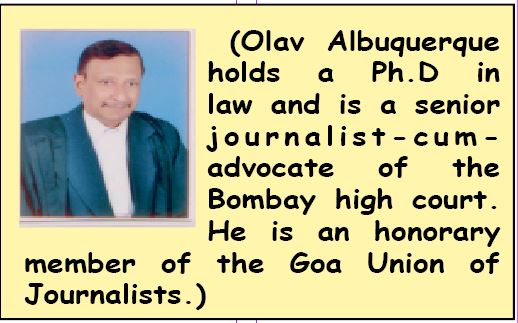By Dr Olav Albuquerque
SHOULD Hindi names of laws be imposed on non-Hindi speaking states – of which Goa is one? This question has cropped up in the Madras High Court where a petition has been filed by a Thoothukudi-based lawyer B Ramkumar Adityan who argued that the Hindi and Sanskrit names of the three new laws violate Article 348 of the Constitution.
For the uninitiated, Article 348 mandates that all authoritative texts including the names of laws enacted by Parliament must be in English. This will ensure that the non-Hindi speaking states like Goa, Tamil Nadu, Kerala, Karnataka, Odisha, Andhra Pradesh, Manipur, Nagaland, West Bengal, will be able to pronounce and understand the meaning of the new laws.
Interestingly, the three new laws known as Bharatiya Nyaya Sanhita or BNS (equivalent of the Indian Penal Code), the Bharatiya Nagarik Suraksha Sanhita (Criminal Procedure Code) and the Bharatiya Sakshya Adhiniyam (equivalent of the Indian Evidence Act) have come into force from July 1. All criminal offences will be registered under the BNS. The Opposition staged a walk-out in protest during the introduction of these three new laws so that there was no discussion on their effect on the people.
A democracy which is what India claims to be, cannot enact laws without there being sufficient debate in Parliament or without inviting the people to send in their suggestions. These laws were introduced on the assumption that the government knows best what is good or bad for the people without their participation.
WHOSE WILL?
OPPOSING the admission of the Writ Petition, additional solicitor general ARL Sundaresan argued that the new names reflect the will of Parliament which had named these laws in their wisdom. “The will of the MPs. The collective will of Parliament is reflected in these names. If it is against the Constitution, then okay. But no rights of the citizens have been affected,” Sundaresan argued vehemently.
He went on to argue that the names of these three new laws were written in the Roman script so that English-speaking people could also have access to them. “Neither the fundamental rights nor the Constitutional principles have been violated by these laws,” argued Sundaresan.
He opposed the interim relief sought by the petitioner to restrain the Union home secretary from implementing the new laws. However, despite vehement arguments and counter-arguments, a division bench of Acting Chief Justice R Mahadevan and Justice Mohammed Shafique were very cautious in their reaction to this landmark petition.
“As of now, I do not want to say anything on this issue. We’ll hear the petition again on July 23rd. The Kerala case is on July 22nd. We will hear you after that, “the bench said while adjourning the petition. This implies the Madras high court bench wants to wait and watch what its counterpart in the Kerala high court will do after a near-identical petition was presented before that bench.
HINDI NOT MOTHER TONGUE OF ALL
HOWEVER, despite the unusually cautious approach of the judges, the petitioner has done thorough research because the lawyer pointed out that Hindi was the mother tongue of only 43.63 per cent of the population. Only eight states out of 28 states and two union territories out of eight list Hindi as their official language,” he pointed out to the court.
He argued that naming crucial laws in Hindi and Sanskrit creates avoidable confusion for the majority of the Indian people who do not speak the Hindi language. He cited data from the 2011 census which stated that only 393,000 people in Tamil Nadu spoke Hindi which would adversely affect the efficiency of law officers, advocates and judicial officers who are not very familiar with Hindi and Sanskrit.
“These names such as Bharatiya Nyaya Sanhita and Bharatiya Nagrik Suraksha Sanhita apart from the Bharatiya Sakshiya Adhiniyam were not easy to pronounce for Tamilian law officers and judicial officers who studied in the Tamil medium. This is why the titles in Hindi and Sanskrit violate our fundamental rights, “ Adityan’s petition said.
The stand of the Union government that over an extended period of time, these names would become familiar to the people cutting across linguistic and cultural divisions does not sound authentic because Kerala, Tamil Nadu and Karnataka have always promoted their own regional languages so that it is possible for students to secure distinctions in their school leaving examinations without knowing a word of Hindi.
IN GOA
IN Goa as well, till the late 1970s, Hindi was an optional subject in the SSC examination so that those who entered the lone engineering college at Farmagudi or the Goa Medical College were not fluent in Hindi. But that is now in the past, because Goan students have now to study Konkani and Hindi making their curriculum burdensome.
Those who appear for the tough Judicial Services Examination to qualify as magistrates in the state must know Hindi as well as Konkani so that they can question people from outside the state. But there have been Supreme Court judges like Justice Jasti Chelameshwar who confessed they were not fluent in Hindi which did not act as a barrier for them to discharge their judicial duties.

